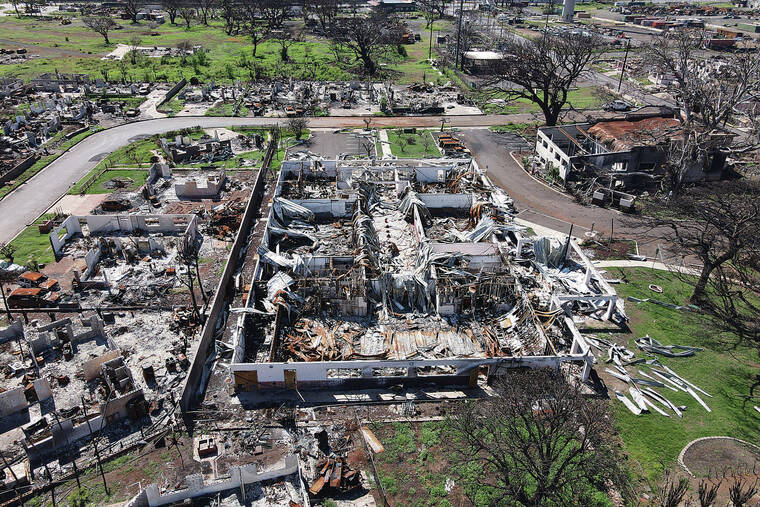HONOLULU — State House and Senate leaders have determined that close to $1 billion should be appropriated by the state for Maui wildfire response and recovery work through mid-2025.
A House-Senate conference committee Thursday agreed on final drafts for two bills to fund most of this anticipated expense based on estimates that have been changing over the past three months.
One measure, Senate Bill 582, would appropriate emergency funding for the current fiscal year, which ends June 30. It includes $297 million for shelter, food and other assistance for survivors of the Aug. 8 Lahaina wildfire, which killed 101 people and destroyed about 3,500 homes.
SB 582 also includes $72.5 million to develop temporary homes for fire survivors, and $65 million for the One Ohana Fund established by Gov. Josh Green to compensate for deaths and serious physical injuries in the fire if applicants forgo litigation.
“I know that’s quite a bit, and I know there are a lot more costs that potentially could arise, but I think we wanted to just make sure in the record that it’s known that these are the numbers that were provided by the governor and that’s the best estimate that we have at this time,” Sen. Troy Hashimoto, co-chair of the committee for the Senate, said during the meeting.
The appropriation for temporary housing is to produce 450 modular homes on state land in Lahaina and is conditioned on at least $40 million being contributed from private sources to complete the estimated $115 million project called Ka La‘i Ola.
On Thursday the Hawai‘i Community Foundation announced that it will provide a $40 million grant for the project, led by the state Department of Human Services in partnership with local nonprofit HomeAid Hawai‘i. Ka La‘i Ola is intended for fire survivors who are not eligible for housing costs paid by the Federal Emergency Management Agency.
“The collective generosity from Maui Strong Fund donors is making Ka La‘i Ola a reality,” Micah Kane, president and CEO of the foundation, said in a statement. “The housing development ensures that survivors of the wildfires will have a safe, stable place to live and it delivers on the strong desire by the community for housing options on West Maui. Importantly, the development also provides critical long-term housing infrastructure to support the ability of Maui families to stay on Maui.”
The bulk of Maui wildfire response and recovery appropriations are in SB 3068 and total close to $460 million, according to a tally by Hashimoto (D, Wailuku-Kahului-Waihee).
The two biggest appropriations in this bill are $200 million for insurance claim payments related to the disaster and $186 million for general recovery costs.
Other appropriations in SB 3068 include:
• $26 million for DHS, which is operating a rental assistance program for wildfire survivors ineligible for federal aid.
• $22 million for the state Department of Land and Natural Resources to add equipment and personnel to carry out fire protection work.
• $2.4 million for the University of Hawai‘i to conduct a multi-ethnic cohort study on health impacts from the fire.
• $1 million for state Public Utilities Commission case work involving electrical utilities.
• $62,500 for a temporary library in Lahaina.
About $37 million of the appropriations in SB 3068 would be from federal funds, including $12.8 million for DHS and $20 million for wildfire response, recovery and prevention by the state Department of Hawaiian Home Lands.
Hawai‘i lawmakers also have included $97 million in the state budget bill for wildfire expenses, including $33 million in state highway work and $64 million for Maui County.
The money for the county would help pay for developing a landfill for permanent fire debris, potable water system repairs, wastewater system repairs, traffic signal replacements, road repairs and land acquisition to improve evacuation routes. Such costs are expected to be reimbursed by FEMA, but that could take until 2027.
Maui County Mayor Richard Bissen recently implored House and Senate leaders to provide the county with $125 million in the coming fiscal year as part of a $402 million request over three years.
A final vote by the full House and Senate on the budget bill, House Bill 1800, is scheduled for today. The two other bills are likely to receive final votes next week.


